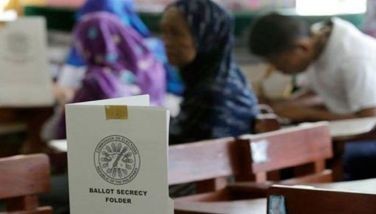Supreme Court's Tinga retires
MANILA, Philippines – Supreme Court Associate Justice Dante Tinga retired from the judiciary yesterday, leaving two vacancies in the High Court with the early retirement of Associate Justice Alicia Austria-Martinez last April 30.
Tinga turned 70 yesterday, the mandatory retirement age for members of the judiciary.
In his six years as associate justice, Tinga authored a total of 747 decisions, penned 437 promulgated resolutions and wrote 67 separate or concurring opinions.
Tinga authored some of the most controversial cases handled by the High Court, among them the Gudani v. Senga case. Brig. Gen. Francisco Gudani and Lt. Col. Alexander Balutan had sought the invalidation of a presidential directive that prohibited petitioners from appearing in congressional inquiries without the president’s consent.
He also penned the ruling on the Sanlakas vs. Executive Secretary case that assailed as unconstitutional Proclamation No. 427 and General Order No. 4 declaring a state of rebellion.
In both cases, the SC sustained Malacañang’s position, which rightly or wrongly affirmed Tinga’s image as a Palace ally. Based on a Newsbreak tally, Tinga has logged a high 70 percent voting record for the government – one of those consistently delivering the votes for the Palace.
Chief Justice Reynato Puno said Justice Tinga “was able to still many of our thoughts in turmoil in just about every field of law” and also “slayed some of the dinosaurs in our jurisprudence.”
“In Constitutional Law, he wrote lengthily on the difference between the doctrine of ‘void for vagueness’ and ‘overbreadth,’ the interplay of the commander-in-chief powers and the power of Congress to compel attendance of military officers in legislative investigations,” Puno said.
“In Civil and Commercial Law, he explained the ‘independence principle’ of letters of credit, the nature of the value-added tax and zero-rated transactions,” he added.
“In Criminal Law, he explained the non-existence of the crime of frustrated theft, the graduation of penalties following the renewed ban on the death penalty. In Family Law, he expounded on marital psychological incapacity and use of DNA. And in International Law, expostulated on the nature and international implications of civil suits for enforcement of a foreign judgment,” the Chief Justice said.
Hardworking
Among the rulings he authored was the GSIS v. Court of Appeals where the SC dismissed the pension fund’s petition to uphold the cease and desist order issued by the Securities and Exchange Commission to stop the validation of proxies in the stockholders’ meeting of the Manila Electric Co.
In the ruling, Tinga reminded the businessmen not to drag the SC into their corporate war.
“The corporate world may very well be reminded that the members of the judiciary are not to be viewed or treated as mere pawns or puppets in the internecine fights businessmen and their associates wage against other businessmen in the quest for corporate dominance,” part of the ruling said.
Tinga also authored the White Light v. City of Manila where the justices struck down as unconstitutional City Ordinance 7774, which prohibits short time admission in motels located in Manila
He was also the ponente in Republic v. Tuvera where the SC ordered Juan Tuvera, Marcos’s presidential assistant, and his son Victor to pay P2 million in damages plus litigation costs in an illegal-logging case.
The Tuveras were accused of using their ties with Marcos in getting a Timber License Agreement in behalf of Twin Peaks Development Corp., where Victor is a major stockholder.
Political background
Appointed to the Tribunal in July 2003, Tinga was Arroyo’s first appointee who came from politics. Tinga was a three-term Taguig-Pateros congressman from 1987-1998. Arroyo’s second appointee who has a political background is Justice Antonio Nachura, who served as Western Samar second district congressman.
He offers no excuses for his tag as one of President Arroyo’s reliable allies in the Supreme Court. He says his work will speak for itself, saying he did his best to serve the country.
Unlike his entry in the political arena, which he described as “more of a happenstance,” Tinga’s entry to the Tribunal was predetermined by a political promise. Tinga related that during the 1998 elections, when Arroyo was campaigning for the vice-presidency, they talked about his plans after his stint in Congress.
“When I become President, I will put you there,” Arroyo told Tinga. Five years later, Arroyo made good on her promise.
Ironically, while high up there in the Olympus that is the SC, Tinga said it was there “that for the first time, I felt my mortality.”
He recalled that as a junior justice, he was “deluged with documents and cases.” The work pushed his blood pressure up.
Seeking to disabuse the minds of the public that the SC is controlled by Arroyo, Tinga pointed out that “she is also losing cases.”
- Latest
- Trending
































